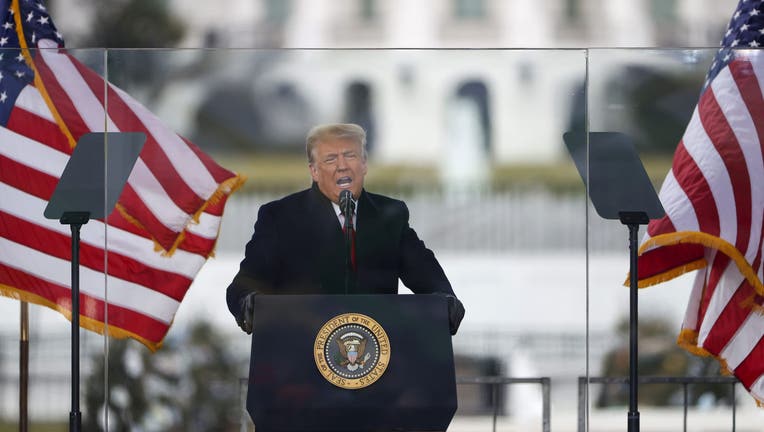Court releases more records in Trump's Jan. 6 criminal case

Then-President Donald Trump speaks at the "Stop The Steal" Rally on January 06, 2021 in Washington, DC. Trump has been criminally charged for his alleged efforts to overturn the results of the 2020 presidential election (Photo by Tasos Katopodis/Gett
A federal court has released a dossier of evidence submitted by special counsel Jack Smith in Donald Trump’s election interference criminal case.
The documents made public Friday total more than 2,000 pages, most of which are still sealed. Witness names are redacted, but some of them could be identified based on previous reports, including former Attorney General William Barr and Georgia election worker Ruby Freeman. The newly released evidence includes testimony from the House committee that investigated the Jan. 6, 2021 attack at the Capitol, a trove of the former president's tweets, as well as grand jury statements and other records that remain sealed.
U.S. District Judge Tanya Chutkan ordered the release Thursday, denying Trump’s request to delay making the documents public until after the election.
"If the court withheld information that the public otherwise had a right to access solely because of the potential political consequences of releasing it, that withholding could itself constitute—or appear to be— election interference," Judge Chutkan said in her ruling.
Trump is accused of election interference in his efforts to overturn the results of the 2020 presidential election, which he lost to Joe Biden. Trump has been charged with obstruction of an official proceeding, conspiracy to obstruct an official proceeding, conspiracy to defraud the U.S. and conspiracy against the right to vote.
The new dossier of evidence follows an explosive court filing that was made public Oct. 2. Those documents allege that Trump "resorted to crimes" in a failed bid to cling to power. The Justice Department argues they were private acts that do not entitle him to immunity from prosecution as a former president.
RELATED: Unsealed court docs say Trump not immune, ‘resorted to crimes’ after losing 2020 election
The Oct. 2 filing includes details of conversations between Trump and then-Vice President Mike Pence and also accuses Trump of delivering "a speech designed to inflame his supporters and motivate them to march to the Capitol" on Jan. 6, 2021.
Trump’s attorneys are expected to file their own brief of up to 180 pages arguing why he should not face trial after the Supreme Court’s July ruling that presidents have broad immunity from criminal prosecution for their official acts.

